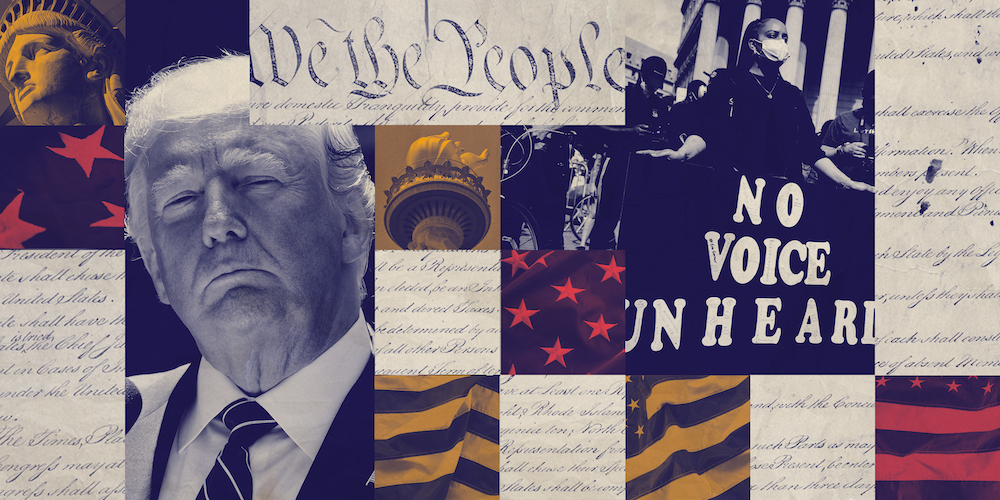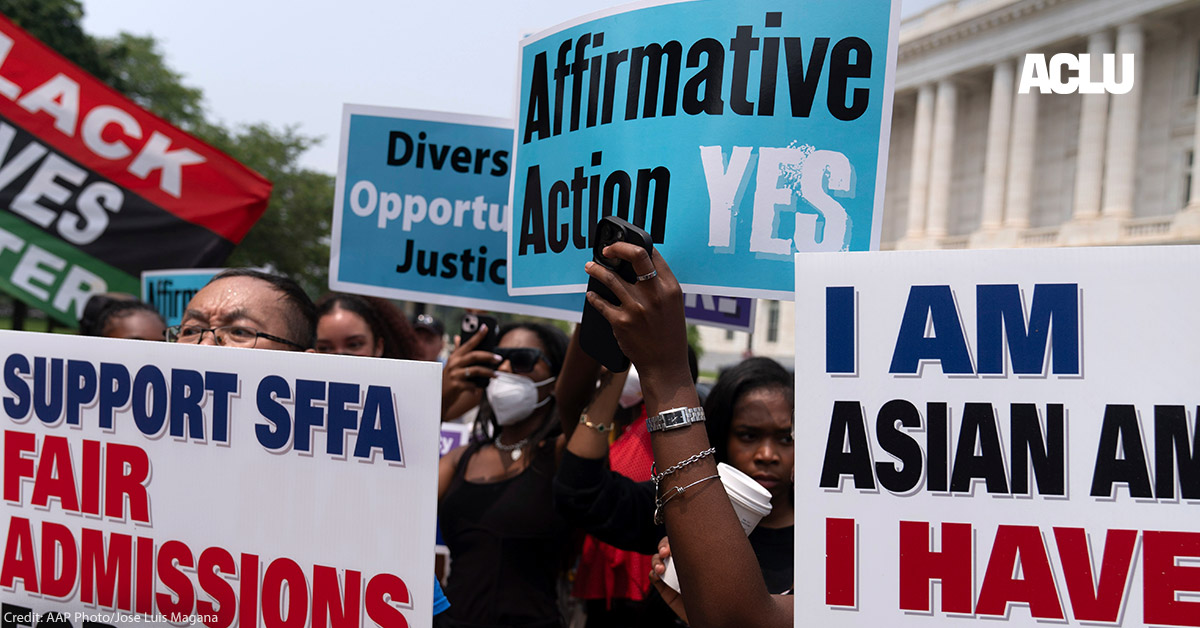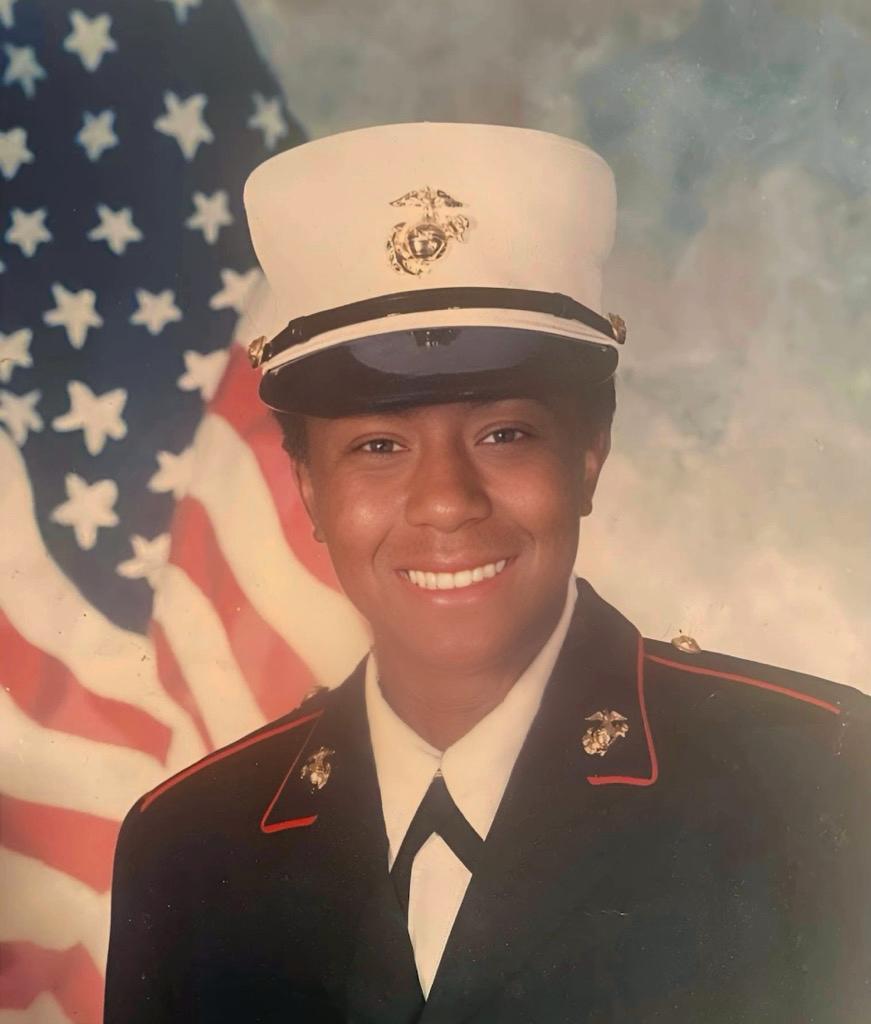Trump’s Attacks on DEI Reveal Administration's Agenda for Second Term
This piece was published before Joe Biden withdrew from the 2024 presidential election and endorsed Vice President Kamala Harris to represent the Democratic Party. No significant facts have been changed or added.
When Donald Trump’s administration ended in 2020, two-thirds of Americans believed that Trump had increased racial tensions in the U.S. The Trump administration's sustained assault on political, civic, and legal efforts to promote racial justice and the administration’s transparent pursuit of an agenda based on white supremacy had pushed the country to its breaking point.
Today, Trump and his supporters have doubled down on this agenda. As part of a larger backlash against racial justice efforts that ignited in the aftermath of the 2020 killings of George Floyd, Ahmaud Arbery, and Breonna Taylor, the 2025 Presidential Transition Project has now made its anti- diversity, equity, and inclusion (DEI) policies a cornerstone of their continued attacks on racial equity and free speech.
In addition to abandoning civil rights enforcement on behalf of marginalized groups, Trump and his supporters plan to intensify right wing attacks on education, employment, and economic opportunity initiatives, and to censor academic discussions about race, gender, and systemic oppression. At the ACLU, we won’t retreat. We’re prepared to challenge the Trump administration’s policies at every level of government. Learn more in our breakdown:
Trump on Diversity, Equity, and Inclusion
The Facts: Based on Trump’s campaign promises – and the detailed policy proposals of Project 2025 – we can expect a second Trump administration to supercharge efforts to reverse gains in civil rights and racial justice in America. Specifically, Trump has promised to continue his attacks on so-called “divisive concepts” and take federal funding from schools with curricula, books, or classes that address race, racism, gender, and sexuality. Trump has also promised to eliminate school administrator positions that oversee DEI initiatives, and to resuscitate the discredited 1776 Commission, which was a presidential advisory committee created in September 2020 by then-President Trump that was tasked with “restoring patriotic education in schools.”
Emboldened by the 2023 repeal of affirmative action in college admissions, a second Trump administration intends to abandon efforts to advance and legally defend affirmative action and DEI policies within military academies, federal minority contracting programs, and other federal programs shown to open opportunities – as well as create inclusive education and workplace environments – unfairly denied to people of color, women, and other marginalized groups. On the regulatory side, a second Trump administration would not only refuse to enforce civil rights regulations on behalf of individuals from historically marginalized groups, but to actively weaken these protections in housing, education, health care, and other essential resources.
Ultimately, Trump has made clear that his goal is to eradicate all programs designed to address profound and persistent inequalities in American life – with the effect of further entrenching, and indeed worsening, systemic inequality.
Why It Matters: Policies that seek to eradicate DEI programs, restrict conversations about race or gender in the classroom, or otherwise attack civil rights efforts are not only unlawful, but undermine our ability to repair decades of discriminatory practices and thrive as a nation. At the state level, we know that efforts to ban books or school curricula addressing the reality of systemic discrimination not only trample on students’ and educators’ constitutional rights, especially their First Amendment rights, but also threaten the retention and academic success of all students.
At the federal level, we know that a second Trump administration would dismantle or refuse to enforce critical DEI programs and initiatives that date back decades. In public health, for example, there are significant disparities in care that are closely linked to structural racism. To remedy historical discrimination and address health outcome disparities, public and private scholarship and fellowship programs have been set up to support pathways to the medical profession for underrepresented medical professionals. Without support for these programs, the race-gap in healthcare would only widen.
How We Got Here: From 2017-2021, the Trump administration used its federal legal and policy authority to bolster far-right attacks on educational and economic opportunity initiatives. For example, the administration used its investigative and legal authority to target efforts by the private sector and institutions of higher education to address inequality.
Specifically, the prior Trump administration consistently subverted traditional legal tools and principles designed to combat unlawful discrimination. It ceased enforcement of, and attempted to dismantle, disparate impact liability -- a bedrock tool for effective civil rights enforcement. The administration also revoked federal guidance designed to address race- and disability-based discrimination in student discipline policies and practices and banned, by executive order, the U.S. Armed Forces, federal agencies, federal contractors, and recipients of federal grants from providing employees with trainings related to race and gender discrimination.
In the Trump administration’s final days, it also launched the 1776 Report, which deceptively recasts the civil rights movement as corrupting progress toward racial equality. Designed to “restore patriotic education in schools,” the 1776 Report compared progressivism to fascism, claimed the civil rights movement embraced ideas similar to those held by defenders of slavery, and sought to downplay the legacy of racism in U.S. history. Historians uniformly condemned the report, pointing out that it was littered with factual inaccuracies, partisan politics, and a lack of serious scholarship.
Our Roadmap: The ACLU filed more than 430 legal actions against the Trump administration, including many lawsuits against that administration’s anti-DEI policies — from fair housing to book bans. If Trump is reelected, we’ll continue to use the courts to combat these discriminatory tactics. That includes asking the court to block any administration’s efforts to undermine the Fair Housing Act.
We will also push Congress to consistently vote against anti-DEI bills and efforts to strip federal funding from such programs, and to amplify through hearings and public statements how these programs work and the reasons why these programs remain critical. We’ll also work with states and municipalities to advance civil rights protections in the public sector and defend inclusive curricula at the K-12 level. Lastly, we’ll provide critical guidance and support to institutions and school districts to combat historical discrimination that is still constitutionally sound, despite aggressive messaging to the contrary.
What Our Experts Say: “Trump and his supporters leveraged last year’s Supreme Court decision on affirmative action to undermine and create confusion around DEI initiatives – even though DEI and affirmative action are two different issues. The ACLU is determined to educate the public on this racist agenda, and continue to defend vital efforts that counteract historical discrimination and unequal access to opportunities. – ReNika Moore, director of the ACLU Racial Justice Program
“It’s important for Americans to realize that Trump’s plans to intensify efforts to eliminate inclusive education practices and policies is a First Amendment issue, as much as it is a civil rights issue. Trump and his supporters are proposing to control what we think and learn by using the government to censor a viewpoint it doesn’t like out of existence.” – Kim Conway, senior policy counsel
What You Can Do Today: The ACLU has challenged classroom censorship laws and book bans across the country. Today, we’re expanding on that work by pushing back against attempts to restrict DEI programs. We won’t stand for the erasure of marginalized communities in our schools. Join us in this critical fight for free speech and equitable education.







